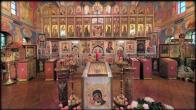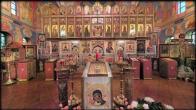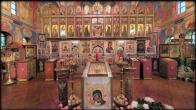You are here
The Healing of the Woman with an Infirmity of Eighteen Years on the Sabbath Day Hypocrisy Three parts to an Orthodox Feast:Preparation, Celebration, Apodosis
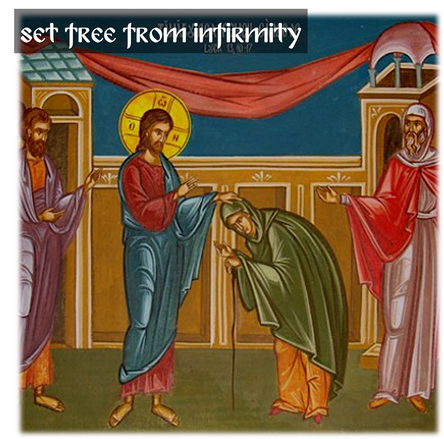
Hypocrisy. Three parts to an Orthodox Feast:Preparation, Celebration, Apodosis
27th Sunday after Pentecost. Luke 13:10-17
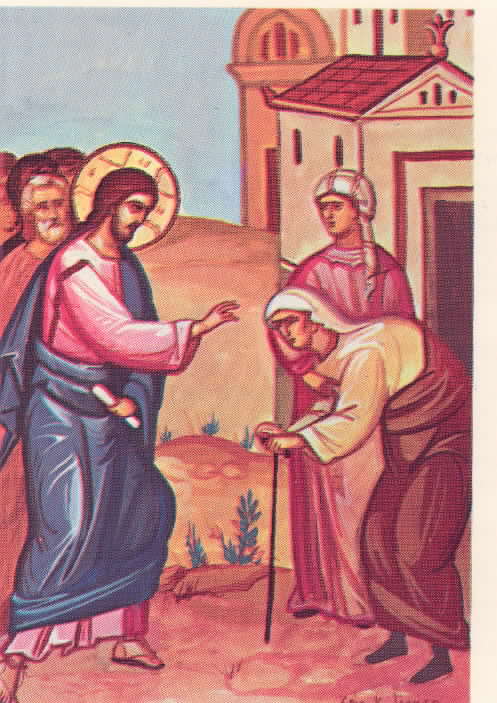 In the Name of the Father and the Son and the Holy Spirit, Amen [1]
In the Name of the Father and the Son and the Holy Spirit, Amen [1]
Today is the Twenty Seventh Sunday after Pentecost and also the apodosis of the Entry of the All Holy Theotokos into the temple. The Apodosis is the last day in which we sing hymns for the feast.
All feasts in the Orthodox Church have three parts to them.
The first part is preparation. We sometimes prepare by fasting as we are doing for the Nativity. And we always have preparatory hymns beforehand, especially in the Katavasia of the canon, which are hymns that are said at the end of each ode of the canon in the All Night Vigil for Matins. There are other hymns we also sing. Sometimes we even have entire services that are just before the great feast itself, like for instance we’ll have vespral divine liturgy for the pre-festival of Holy Nativity of the Lord the day before the Nativity.
So we prepare for the outpouring of grace that God will give us on a particular feast day. Without this preparation and expectation, we will surely not be able to accept and understand much of what God wants to impart to us on the day of the feast, and those days immediately following.
Then of course there is the feast day itself when we sing hymns and commemorate that specific occurrence, that specific saint especially. After this there is the post-festal period, the time in which we still sing hymns about the feast and we remember it and we, like the Theotokos, “treasure these things in our hearts” [2], as is said of her by the Evangelist concerning all the things that she saw in her life that Christ did and said. She treasured them all up in her heart.
We should be like that, too. We should not be so quick to let go. When God gives us grace don’t let go so fast. Don’t immediately forget and go out into the world and just forget what happened the past week, the past Sunday, yesterday. We must take time to think about these things and muse over them and pray about them.
And then on the last day, if it’s an especially great feast of the Lord or of the Theotokos, we almost reprise the feast. We sing the same hymns – not all of them, but many of them that we sang on the feast day itself. So for instance today we had the troparion and kontakion for the Theotokos’ Entry. We also sang the exact same Epistle and the exact same Gospel that was said on Wednesday morning when we had the Divine Liturgy.
We also commemorate the Hieromartyr Clement, Pope of Rome today. And in the primary reading for today we hear about the healing of the woman who had an infirmity of eighteen years, and she was healed on the Sabbath day.
As is usual, in the readings of the Gospel, there is an inner and an outer meaning. The outer meaning is pretty clear to see, when Jesus Christ rebukes this synagogue leader. It is very clear how foolish his words were. So we know the outer meaning that there is no time prescribed especially for mercy. All time is for mercy. God implants in us an understanding of things, and we have to be able to judge rightly. And we know when we should show mercy. There is no time when man should put some law ahead of showing mercy.
There is an inner meaning, too, because this woman was all bent together. She could not straighten up. She could in no wise lift herself up. There is a great meaning to that infirmity that she had, and our Lord’s healing her on the Sabbath day.
Our Lord was teaching in one of the synagogues on the Sabbath, and this was a habit of His. This is a very Jewish habit to speak all day in the synagogue on the Sabbath. And we try to emulate that in a poor way, unfortunately like the apostles did it, because of our sins and laziness. Not like the early Christians did it, who had so much zeal. But we serve the All Night Vigil and we serve the Divine Liturgy and we preach at the Liturgy and I often preach at the Vigil as well because we need to know as many holy things as we can.
We need to continually be feeding ourselves with holiness, because we’re so continually, unfortunately, imbibing the bitter dregs of the world. So we must do something to dilute that and to eventually cast it out. And if you do not meditate upon holy things, you won’t become holy. It’s too bad that we don’t spend all day speaking of holy things. It would be good if we did.
The purpose of our gathering together on Saturday and Sunday is to worship, to expect God to do something to us by partaking of His mysteries to be sure, to have enlightenment, the medicine of immortality within us. But also, to taste something of the sweetness of the Church’s theology. It’s God-breathed, you know. The services are inspired by the Holy Spirit and they breathe as the Holy Spirit breathes. And if you listen and if you pray, you can hear it. You can hear God in His services.
Saturday and Sunday are consecrated to our remembrance of God. Unfortunately we do not Him remember every day. Unfortunately, we fall into grievous sin. We get distracted. But if we can struggle to pay attention on Saturday and Sunday, whatever our position (I struggle to pay attention, too) – God will enlighten us. Of course, we will break bread together, most of us, and be able to taste of the heavenly bread.
But I tell you, if you don’t come here with an expectation that God will teach you and enlighten you and make you straighten up, as one who cannot lift yourself up, and if you do not struggle, then you will come away today poor and wretched and unenlightened. You might commune but you won’t have received any benefit from this heavenly food because you won’t have struggled.
So you must struggle. Struggle by coming to the vigil and having expectation that God will teach you, listening as well as you can. And when you fall away from listening, pull yourself back. I don’t know any other way to do it. I don’t know any other way to explain it. You just struggle and struggle and struggle. And eventually God will indeed make us capable of those things that we are struggling to do. He will help us.
“And, behold, there was a woman which had a spirit of infirmity eighteen years, and was bowed together, and could in no wise lift up herself. And when Jesus saw her, he called her to him, and said unto her, Woman, thou art loosed from thine infirmity. And he laid his hands on her: and immediately she was made straight, and glorified God.” [3]
The God-man can just say, “Thou art loosed.”, and she was loosed from her infirmity of eighteen years, long standing pain and sadness over her infirmity. It was a long time, and the fathers say that this was mentioned so that we could know, this was God’s work. This is in God’s territory. God can heal a man. No man can heal another man. And this is a very simple miracle. There is not much fanfare to it. There is not much of a lead up to it, such as in the miracle of Jairus’ daughter [4], where there is a whole procession that occurs. And that has something to each us.
But here, Jesus Christ, matter of factly, as the God-man, as the one who created us, cast out Satan with only a word. “Thou art loosed,” by the authority of the God-man. Now man cannot do this. This woman was bent. She was crooked. Solomon says, “I have seen all the works that are done under the sun; and, behold, all is vanity and vexation of spirit. That which is crooked cannot be made straight: and that which is wanting cannot be numbered.” [5]
“Thou art loosed.” Our Lord tells her, ‘Thou cannot help Thyself, but I, the God-man can. And I have come to help, and I will. Thou art loosed from thy sins, from thy passions.’
And why do I say that? Because crookedness is a metaphor for sin and for tempestuousness, for being lost in the vanity of the world. ‘I am the healer. I came to heal thee. I came to make thee able to see me. You cannot see me when you are bent down. You can only see the ground. But I will straighten you up, and then you will see Me, as I am.’
Why was this woman oppressed? I told you before, again, I say it was her sins that oppressed her. This is a great mystery. We don’t always know why a person suffers. Sometimes they suffer because of their sins, sometimes not. But that is God’s territory. We cannot delve into these matters. We must only speak of them with fear and trembling, so as not to offend the Divine Majesty.
Some people grow old and fat and they are wicked. Some people are young and they die in virtue. Some people struggle and never seem to be able to get around the problems of life. Other people have a relatively easy time of it. God knows for each man what his position in life should be for the best possibility for his salvation, and we don’t know. But this woman was bent and crooked, so the crookedness indicates that she was suffering because of her sins. And she suffered manfully. She suffered for eighteen years. And she came to the temple, and she was hoping to be cured.
There is another incident where Christ cures someone. I can be so bold and say that this woman had sins is because of this incident. “And, behold, they brought to him a man sick of the palsy, lying on a bed: and Jesus seeing their faith said unto the sick of the palsy; Son, be of good cheer; thy sins be forgiven thee. “ [6]
What an odd thing that must have been to hear. Here a person comes laid out, unable to move their limbs, and Jesus Christ says, “Thy sins be forgiven thee.” Some of these people must have thought, “Well, yes, but don’t you see what’s wrong with the man?” And then others thought, “He blasphemes.” But this man was sick because of his sins, and this woman was crippled because of her sins. And God enlightened both of them. He healed them of their sins first. He loosed this woman of her infirmity so that she could look up at the God-man, and then she could commence to live a Christian life.
Our Lord came indeed to straighten out crookedness. The Baptizer says – this is quoted from Isaiah, which is a prophecy about the Baptizer-
“The voice of him that crieth in the wilderness, Prepare ye the way of the LORD, make straight in the desert a highway for our God. Every valley shall be exalted, and every mountain and hill shall be made low: and the crooked shall be made straight, and the rough places plain:” [7]
The baptizer only announced that this would occur, and the God-man made it so. Our Lord directly promises through the mouth of the God-inspired Isaiah
“And I will bring the blind by a way that they knew not; I will lead them in paths that they have not known: I will make darkness light before them, and crooked things straight. These things will I do unto them, and not forsake them.” [8]
Only God can make that which is crooked straight. And so what happened when this woman was loosed from her infirmity? You would think that everyone would have been in awe before God and they would have fallen on their faces saying, “Lord have mercy.” But what happened?
“And the ruler of the synagogue answered with indignation, because that Jesus had healed on the sabbath day, and said unto the people, There are six days in which men ought to work: in them therefore come and be healed, and not on the sabbath day.” [9]
What amazing words. What amazing stupidity. This man was filled with envy and jealousy, and that’s what clouded his mind. His anger made him crazy to say such insane things. What kind of beast would liken mercy on the Sabbath day to common labor in the field?
Isn’t the Sabbath a day of rest, though? He’s right about that. The ruler of the synagogue is saying a partial truth you know. The Sabbath day is a day of rest according to the Jewish law. And our Sabbath, our day of rest, today, is the same, where we should rest in Christ and meditate on holy things. But is not Christ giving this woman rest? Is He not fulfilling the Sabbath day? Indeed. This woman had eighteen years of no rest, of sleeplessness, and of hunger, and of pain, and of despondency. And our Lord, on the Sabbath, the day of rest, gave this woman rest. And this synagogue leader was too stupid, too full of pride, too full of arrogance to see this.
Notice how he addresses this question that he brings up. He does not say anything to Christ directly. He doesn’t have the guts to do it. But he is aiming for the glory of men, for the honor of men. So what does he do? He says this out to the congregation, so as to get partners in crime with him, so as to feel emboldened by other people being full of sin. But the Lord answered him very simply and plainly. And he said a word that does not occur very often in the scriptures, by the way. And when it occurs, you should be terrified, concerning what a hypocrite is.
“The Lord then answered him, and said, Thou hypocrite, doth not each one of you on the sabbath loose his ox or his ass from the stall, and lead him away to watering? And ought not this woman, being a daughter of Abraham, whom Satan hath bound, lo, these eighteen years, be loosed from this bond on the sabbath day? And when he had said these things, all his adversaries were ashamed: and all the people rejoiced for all the glorious things that were done by him.” [10]
This man, this sinner, this prideful and arrogant person looking for the glory of men, would not address the Lord directly, but our Lord indeed directly talked to him and to all of the pharisees and the other fellow sinners who wanted the glory of men, and gave up mercy for their pride. Why is this man a hypocrite? He’s putting on airs. He cares nothing for mercy, but only for show. “An hypocrite with his mouth destroyeth his neighbor: but through knowledge shall the just be delivered.” [11] So it says, the holy Solomon says, in his proverbs. And then, our Lord says, concerning the scribes, the pharisees, the synagogue leaders, and all those others who are hypocrites,
“Ye hypocrites, well did Esaias prophesy of you, saying, This people draweth nigh unto me with their mouth, and honoureth me with their lips; but their heart is far from me. But in vain they do worship me, teaching for doctrines the commandments of men. And he called the multitude, and said unto them, Hear, and understand: Not that which goeth into the mouth defileth a man; but that which cometh out of the mouth, this defileth a man.” [12]
This principle that Christ gives about food and about true defilement is the same principle about whether or not one should heal on the Sabbath day. Of course one should heal on the Sabbath day!. One should heal on any day. One should show mercy on any day, in any circumstance. And to even ask the question shows the abysmal ignorance of the interrogator. “But woe unto you, scribes and Pharisees, hypocrites!” , you people who question in silly and obtuse ways the mercy of God, “for ye shut up the kingdom of heaven against men: for ye neither go in yourselves, neither suffer ye them that are entering to go in.” [13]
To be called a hypocrite is indeed a terrible thing. And hypocrisy is something that is probably present in each one of us. It is a sin. We must confess it. We must root it out.
Our whole society is full of hypocrisy. Our whole society runs on hypocrisy. It is a lie. It is trying to look like something we are not. It is not being genuine. It’s making false promises. It’s not showing mercy when we proclaim ourselves to be Christians. It’s not praying for our brother when we see he has a need because we have some other task that troubles us. It’s not living the Christian life when we have made that promise in our baptism.
Oh yes, hypocrisy is a great sin. And if a man looks inside himself, he should say, “Thou hypocrite.” And the moment he says those words he should think about what our Lord says about hypocrites and he should fall on his face and be like the publican who said, “God, be merciful unto me a sinner.” [14]
Now this woman was called a daughter of Abraham. And why? On account of her faith. “I am the God of Abraham, and the God of Isaac, and the God of Jacob? God is not the God of the dead, but of the living.” [15] This woman was not dead. This woman was alive in faith. She had faith, and therefore she was considered a daughter of Abraham.
And Jesus said in another place to a man, who had also been healed of his infirmity, having nothing wrong with him physically but being filled with the sin of lust for wealth, that is Zacchaeus: “ This day is salvation come to this house, forsomuch as he also is a son of Abraham. For the Son of man is come to seek and to save that which was lost.” [16] So indeed he is a son of Abraham, and this woman is a son of Abraham, and not because of her virtue but because of her belief, and because of her desire to live virtuously.
But He wouldn’t say such a thing about the ruler of the synagogue now, would he? He called him a hypocrite. Here is what Jesus has to say about the hypocrites. In another context, it was written that, “They answered and said unto him, Abraham is our father. Jesus saith unto them, If ye were Abraham’s children, ye would do the works of Abraham.” [17] So this is why I tell you that this woman was a daughter of Abraham on account of her faith. You can see that to be called a son of Abraham or a daughter of Abraham means that you believe and act according to your belief. And even though this woman had some sins that had bound her, God released her. And now she was able to live virtuously.
There is a practicality that I think we should inculcate in ourselves, that we can learn from this particular passage of scripture. It’s easy to see that one should show mercy on any day. And yet this man, this synagogue leader, this sinner, didn’t see that, because he was so concerned about other extraneous details, and concerned about the boastful pride of life, and the honor of men. But if we’re guided by the Holy Spirit, we can discern rightly. We can discern truly. We can see what is right and what is false. We can understand. We can know that the body is not for meat. Meats are for the body [18], and if one has a need according to the body, one eats according to one’s need. We understand that principle in fasting. It is because the Holy Spirit inspires us, and makes us know. Makes us understand that only if we have humility, only if we expect and hope that God will fill us with His grace. And then of course we have to act upon His grace, and we have to root out this sin of hypocrisy that is being shown.
A hypocrite will not inherit the kingdom of heaven. And I also tell you that the vast majority of people in this life are hypocrites. It is true. It is very true. That is why there is so little piety in our day – because people give lip service. These people, their heart is far from me. [19] Their lips speak about me but their heart is far from me, the Lord says. And that is what our day is like.
Root out from yourselves hypocrisy, brothers and sisters. If there is anything in you that puts on airs, if there is anything in you that forgets to show mercy, if there is anything in you that looks for the honor of men, if there is anything in you that is lazy and does not wish to worship God at the appointed times, then you have something to repent from: your hypocrisy. Because you made promises, as I made as well. It’s true, I suppose on a small level, moment by moment we fall into moments of hypocrisy.
That is why God will loose us – He is there to loose us -from our infirmity. If we struggle against such things, God will indeed loose us. But if we do not, then we will fall into the depths of hell, maybe not even knowing it. Maybe we’ll be very surprised on Judgment Day when our Lord says, “I don’t know you” [20]. ‘I don’t know you because you are a hypocrite. And I have no concourse with hypocrites. I told you everything you needed to know. I gave you everything you needed. And I had children that were suffering, lack of bread and jail and derision for my sake and they still prayed with fervor. And you lived without care and without thought. You lived as a hypocrite. You are no better than the ruler of the synagogue, and you can go join him.’
Let us not be hypocrites. Let us ask God to enlighten us. And in any sin that we have, whether it be hypocrisy or any other sin, let us fall down before Christ. Let us ask Him to forgive us. And then we have to seal our part of the bargain. We have to make an effort to live according to His commandments. May God help us in all things. Amen.
Bibliography:
Old Believer Sermon for the 27th Sunday after Pentecost (unpublished)
“Drops From the Living Water”, Bishop Augustinos
“Commentary on the Gospel of St. Luke”, St. Cyril, Patriarch of Alexandria.
Priest Seraphim Holland 2009. St Nicholas Russian Orthodox Church, McKinney, Texas
This and other Orthodox materials are available in from:
|
Mailing Address |
Box 37, McKinney, TX 75070 |
|
Rectory Phone |
972/529-2754 |
|
|
|
|
Web Page |
|
This homily is at:
New sermons, commentaries, etc are posted on our BLOG: http://www/.orthodox.net/redeemingthetime
Archive of commentaries: http://www.orthodox.net/scripture
Archive of homilies: http://www.orthodox.net/sermons
To receive regular mailings of sermons, and scriptural and services commentary and other things throughout the church year, read our blog “Redeeming the Time” (http://www.orthodox.net/redeemingthetime). You may also subscribe to the RSS Feed or receive its postings by email.
Our parish Email list ( http://groups.google.com/group/saint-nicholas-orthodox-church) also has all the latest postings from our website and blog; everyone is welcome to join.
All rights reserved. Please use this material in any edifying reason. We ask that you contact St. Nicholas if you wish to distribute it in any way. We grant permission to post this text, if completely intact only, including this paragraph and the URL of the text, to any electronic mailing list, church bulletin, web page or blog.
[1] This homily was transcribed from one given On November 25, 1996 according to the church calendar, being the Twenty Seventh Sunday after Pentecost, and Apodosis of the Entry of the All Holy Theotokos into the Temple.
Apodosis means “leave-taking”, and is the day in which the major aspects of a feast are revisited in the church’s hymnology, and is the third “part” of the proper way in which a Great Feast is celebrated, these being:
· Preparation
· Hymns are sung sometimes weeks in advance of the feast, especially the Katavasia at the canon.
· In the case of especially solemn and important feasts, fasting in enjoined (such as before the Lord’s Nativity, Pascha, the Dormition of the Theotokos, and the Feast of Saints Peter and Paul).
· There are often pre-festal services in the immediate day or days before the feast. An example of this would be the true Vespral liturgy (this is NEVER substituted for Vigil and liturgy on the day of the feast itself) that the Typicon directs to be served the day before Theophany and Nativity. The entire week before Pascha, “Holy Week” is considered a “pre-festal” period! If you miss even one of those services without due cause, you are cheating yourself out of a full understanding of the feast, and a full measure of the outpouring of God’s grace upon you.
· The Day of the Feast
· The Feast itself is always served with Vigil with Divine Liturgy the following day. If vigil is not served, great vespers with a FULL matins (otherwise the essence of the feast is lost) and Divine liturgy is served the next day.
· The Post-festal period and Apodosis
· In the days following the feast, sometimes up to a week, or in the case of Pascha, even until The Ascension, forty days later, the feast is continually remembered with hymns.
· On the last day of the feast, it is recalled again with many of the hymns that were sung on the feast day itself.
The Orthodox way of celebrating a feast, unfortunately forgotten or ignored in our day, is very “Jewish”. For example, Pentecost was a three day feast for the Jews.
This day was also the commemoration of Hieromartyr Clement, Pope of Rome The Epistle reading appointed is Ephesians 6:10-17, and the Gospel is 13:10-17.
There are some stylistic changes and minor corrections made and several footnotes have been added, but otherwise, it is essentially in a colloquial, “spoken” style. It is hoped that something in these words will help and edify the reader, but a sermon read from a page cannot enlighten a soul as much as attendance and reverent worship at the Vigil service, which prepares the soul for the Holy Liturgy, and the hearing of the scriptures and the preaching of them in the context of the Holy Divine Liturgy. In such circumstances the soul is enlightened much more than when words are read on a page.
[2] Cf. Luke 2:18-19 “And all they that heard it wondered at those things which were told them by the shepherds.
But Mary kept all these things, and pondered them in her heart.”
[3] Luke 13:11-13
[4] Cf. Mark 5:22-42 and Luke 8:41-56, where the raising of Jairus’ daughter, and the healing of the woman with an issue of blood is recounted in powerful detail.
[5] Ecclesiastes 1:14-15
[6] Matthew 9:2
[7] Isaiah 39:3-4
[8] Isaiah 42:16
[9] Luke 13:14
[10] Luke 13:14-17
[11] Proverbs 11:9
[12] Matthew:15:7-11
[13] Matthew 23:13
[14] Cf. Luke 18:13-14, “And the publican, standing afar off, would not lift up so much as his eyes unto heaven, but smote upon his breast, saying, God be merciful to me a sinner. I tell you, this man went down to his house justified rather than the other: for every one that exalteth himself shall be abased; and he that humbleth himself shall be exalted.”
[15] Matthew 22:32
[16] Luke 19:9-10
[17] John 8:39
[18] Cf. ! Cor 6:13
[19] Cf. Matthew 15:8, “This people draweth nigh unto me with their mouth, and honoureth me with their lips; but their heart is far from me.” and Mark 7:6, “Well hath Esaias prophesied of you hypocrites, as it is written, This people honoureth me with their lips, but their heart is far from me.” See also Isaiah 29:13, which the Lord quotes.
[20] Cf. Luke 13:25, “When once the master of the house is risen up, and hath shut to the door, and ye begin to stand without, and to knock at the door, saying, Lord, Lord, open unto us; and he shall answer and say unto you, I know you not whence ye are”.
PARISH LIFE
RECENT VIDEOS
Address of our Cathedral
Subscribe to our mailing list
While all the materials on this site are copyrighted, you may use them freely as long as you treat them
with respect and provide attribution on the Russian Orthodox Cathedral of St.John the Baptist of Washington DC.



